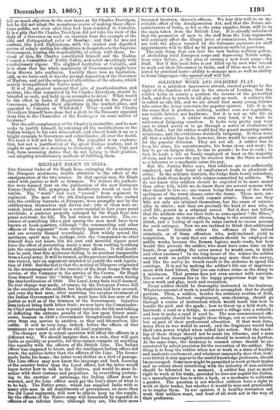SOLDIERS' WORK AND SOLDIERS' PLAY.
THERE is a mistaken impression abroad, created perhaps by the sight of the familiar red coat in the streets of London, that the soldier holds in society a position the reverse of the proverbial Jack, and that he revels in all play and no work. A soldier's life is called an idle life, and we are afraid that many young fellows who enter the Army entertain the popular opinion. Idle it is in the sense that it produces nothing, neither corn nor vegetables, nor textile fabrics, nor hardware. But it is not an idle life in any other sense. A soldier works very hard, if by work be understood fatiguing exertion. It looks very pretty and very easy to stand sentry or to go through a series of evolutions in Hyde Park ; but the critics would find the guard mounting rather wearisome, and the evolutions decidedly fatiguing. If these were all that a soldier has to do, however, there would be some ground for the popular delusion. They are not all. A soldier has to keep his arms, his accoutrements, his home clean and neat ; he has to go on fatigue duty, he has to parade ; he has to cook ; in fact, he leads a life as busily employed at least as the majority of men, and he earns the pay he receives from the State as much as a labourer or a mechanic earns his pay.
But Mr. Justice Byles says, that soldiers are not sufficiently employed, and that want of employment leads to plenitude of crime. In the military districts, the Judge finds heavy calendars, and he finds them heavy with crimes committed by soldiers. We do not know why soldiers should be expected to be more moral than other folk, while we do know there are several reasons why they should be less so ; one reason being that many of the worst specimens of the worst classes enter the Army. These men, em- ployed or unemployed, would commit crimes. These are they who not only are criminal themselves, but the cause of crimin- ality in others ; and they are precisely the kind of men who, in civil life, persist in a criminal career. But it does not follow, that the soldiers who use their belts as arms against "the Blues," or who engage in riotous affrays, belong to the criminal classes. Drink, and a feeling of esprit de corps carried to excess account for such outrages. Now we are inclined to think that additional work would diminish either the offences of the inbred criminals, or of those offenders who, well-inclined, yield to temptation. It is said that our soldiers should be employed on public works, because the Roman legions made roads, but how would this prevent the soldier, who must have some time on his hands, from spending the extra money he would earn, in drink and other excesses ? In the long hours of the winter the soldier cannot work on public undertakings any more than the navvy, and like the navvy he would resort to the alehouse to spend his earnings. It is not by making the soldier's life one of imprison- ment with hard labour, that you can reduce crime in the Army to a minimum. That process does not even answer with convicts. The secret of success lies in the happy proportions kept up be- tween work and play, work and recreation. Every soldier should be thoroughly instructed in his business. Whatever amount of work is needful to accomplish that he should perform. Thus, a soldier, besides the ordinary routine of drill, fatigue, sentry, barrack employment, arm-cleaning, should go through a course of instruction which would teach him how to handle the pick and the spade ; how to throw up a field work, to barricade a road or a bridge, to convert a village into a redoubt ; and how to make a road if need be. The non-commissioned offi- cers especially should be taught these things, not as extra labour, but as part of their professional education. If that were done, many lives in war would be saved, and the Engineers would find their own power tripled when called into action. But the teach- ing of these things should not be made too irksome, and a man who had been thoroughly instructed should be worried no further. At the same time, the tendency to commit crime should be en- countered by adroit provision for the recreation of the soldier. The thing is to keep the soldier when not at work in a state of healthy and moderate excitement, and whatever innocently does that, how- ever trivial it may appear to the useful knowledge professors, should be encouraged. Some men might be permitted to work at their trades and no outcry about interfering with the industry of non-soldiers should be tolerated for a moment. A soldier has just as much right to work at his trade, provided he does not neglect his duties, as a manufacturer has to write a book, or a mechanic to cultivate a garden. The question is not whether soldiers have a right to work at their trades, but whether it would be wise and practicable so to employ them. In our opinion, it is healthy recreation not work that soldiers want, and least of all work not in the way of their profession.


























 Previous page
Previous page